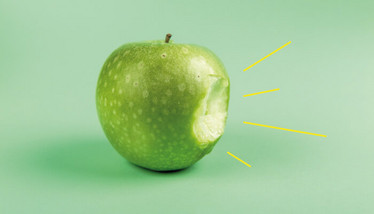Bitesize Breakthroughs
Five papers that piqued our interest...
Luke Turner, Michael Schubert, James Strachan, Stephanie Vine | | Quick Read

Dampening dyskinesia
Investigational drug HU-308, which acts on CB2 receptors in the brain, lessened involuntary movements (dyskinesia) – a common side effect of drug treatment for Parkinson’s disease – in a mouse model (1).
Testing times
We already know that over one-fifth of CBD products for health and wellness contain THC not listed on the label (2). A new study now reports that two out of six participants tested positive for THC after vaping CBDpredominant cannabis just once – a combination that could spell trouble for users undergoing drug testing (3).
Losing sleep
Cannabinoids might not be the answer chronic pain sufferers have been waiting for. Even though recent studies found a positive effect of medical cannabis on sleep, a new report suggests that frequent use may result in tolerance and worse sleep overall (4).
Breaking connections
Endocannabinoid 2-AG reduces connections in the brain that cause stress and anxiety, a new study found. A strong circuit between the amygdala and frontal cortex is linked to anxiety disorders – so pharmacologic treatments to increase levels of 2-AG could regulate anxiety symptoms and avoid reliance on medical marijuana (5).
Clouding the issue
An analysis of 240 news articles published between January 2015 and June 2019 showed that treatments involving cannabis and opioids received a disproportionate degree of press coverage, at the expense of best practice non-drug treatments (6).
- P Rentsch et al., Neurobiol Dis, 134, 104646 (2019).
- MO Bonn-Miller et al., JAMA, 318, 1708-1709.
- TR Spindle et al., J Anal Toxicol, bkz080 (2019).
- SR Sznitman et al., BMJ Support Palliat Care, [Epub ahead of print] (2020).
- DJ Marcus et al., Neuron, [Epub ahead of print] (2020).
- H Devan, N Z Med J, 133, 92 (2020).
While completing my undergraduate degree in Biology, I soon discovered that my passion and strength was for writing about science rather than working in the lab. My master’s degree in Science Communication allowed me to develop my science writing skills and I was lucky enough to come to Texere Publishing straight from University. Here I am given the opportunity to write about cutting edge research and engage with leading scientists, while also being part of a fantastic team!

While obtaining degrees in biology from the University of Alberta and biochemistry from Penn State College of Medicine, I worked as a freelance science and medical writer. I was able to hone my skills in research, presentation and scientific writing by assembling grants and journal articles, speaking at international conferences, and consulting on topics ranging from medical education to comic book science. As much as I’ve enjoyed designing new bacteria and plausible superheroes, though, I’m more pleased than ever to be at Texere, using my writing and editing skills to create great content for a professional audience.

Over the course of my Biomedical Sciences degree it dawned on me that my goal of becoming a scientist didn’t quite mesh with my lack of affinity for lab work. Thinking on my decision to pursue biology rather than English at age 15 – despite an aptitude for the latter – I realized that science writing was a way to combine what I loved with what I was good at.
From there I set out to gather as much freelancing experience as I could, spending 2 years developing scientific content for International Innovation, before completing an MSc in Science Communication. After gaining invaluable experience in supporting the communications efforts of CERN and IN-PART, I joined Texere – where I am focused on producing consistently engaging, cutting-edge and innovative content for our specialist audiences around the world.
"Making great scientific magazines isn’t just about delivering knowledge and high quality content; it’s also about packaging these in the right words to ensure that someone is truly inspired by a topic. My passion is ensuring that our authors’ expertise is presented as a seamless and enjoyable reading experience, whether in print, in digital or on social media. I’ve spent seven years writing and editing features for scientific and manufacturing publications, and in making this content engaging and accessible without sacrificing its scientific integrity. There is nothing better than a magazine with great content that feels great to read."












